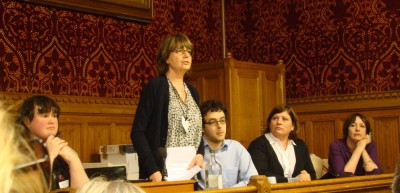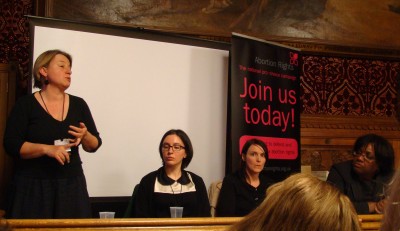On Wednesday, in the House of Commons, Abortion Rights held a packed meeting with members of all parties to go on the front foot over a woman’s right to control her own body.

Kay Carberry (standing), Richy Thompson, Emily Thornberry MP, Zoe Williams
There is a rise in attacks on women’s rights, from various Parliamentary adventures by Nadine Dorries MP to the pickets of clinics in Brighton and Bloomsbury there is a rising confidence among those who would roll back the advances made in women’s rights.
Hackney MP Diane Abbott expressed concern at the “direction of travel” of many incremental reforms that, taken together, constitute a “very serious push back against a woman’s right to choose.”
She speculated that the Conservative leadership was happy to allow those on the right of the party to make the running on this issue because for them it was “better that they talk about women’s wombs than Europe.”
Islington MP, Emily Thornberry, said that “there must be no return to the days of back street abortions.” She was distressed to see the pickets of abortion clinics was going unpoliced saying it was essential that we “uphold the rule of law” and allow women to go about their business unmolested. “It is not right and not legal to intimidate women as they go into clinics.”
Conservative MP Amber Rudd said that it was important to recognise who the enemy was in this debate rather than label this as a Conservative vs others debate. She pointed out that there was a strong tradition of Catholic Labour MPs who would not support women’s rights to choose and that the majority of the Conservative MPs were pro-choice and it was crucial to keep them on side to keep a majority on the floor of the House.
Natalie Bennett (right) speaking for the Green Party said that it was no use simply being on the defensive and “we have to push back at them.” Abortions should not be seen as a problem or immoral. “The right number of abortions is the number of abortions women want.” Highlighting the fact that “people don’t understand the failure rates of contraception” leading to many unwanted pregnancies.
She continued “we have to get to a point where we have 21st century abortion rules and find ways to make this happen. This is an issue of equality, not just gender equality but equality of rich and poor. Abortion rights are an absolute foundation of a woman’s place in society.”
Other speakers included Richy Thompson of the British Humanist Association who highlighted the failure of sex education. There’s no state school requirement to teach children about abortion but in free schools anti-abortion groups have been allowed to fill kids with ideas about “post abortion trauma”.
Kat Banyard, founder of UK Feminista, suggested in a thoughtful contribution that “we need to respond to attacks but start setting the agenda ourselves.” The “power of protest is to shift the mainstream” and that meant activists needed to ensure they sustain the movement.
Guardian columnist Zoe Williams pointed to the outlyers on the other side who were “moving the debate that way” and she was concerned that “women who get pregnant are being repositioned as vulnerable women.” At the end of the day abortion is “a medical procedure” and that “we have to take a bit more pride where we have got.”
Kay Carberry, the TUC Assistant General Secretary, emphasised the useful role that trade unions can play in moving women’s rights forwards. It’s “working class women and ones on low incomes who suffer the most when there are restrictions on a woman’s right to choose.” If the government was really keen on bringing down the rate of unwanted pregnancies they would be investing in “sexual health services and education for young people, but the opposite is happening.”
Clare Murphy, Director of Press and Public Policy at BPAS, said that “anti-abortion views have been given undue weight and attention. These things have real consequences for women and the [anti-abortion] protesters have been emboldened by those like Nadine Dorries.” However she added that workers at the clinics “felt extremely well supported by people like yourselves.”
The meeting was upbeat and gave positive, concrete suggestions as to how to take the women’s movement forwards marginalising those who are ideologically wedded to restricting the rights of women too control their own bodies and bringin together the pro-choice consensus across the country.
See also Education for choice who have blogged on the meeting.




1 Comment
So does the unborn child have any rights at all?